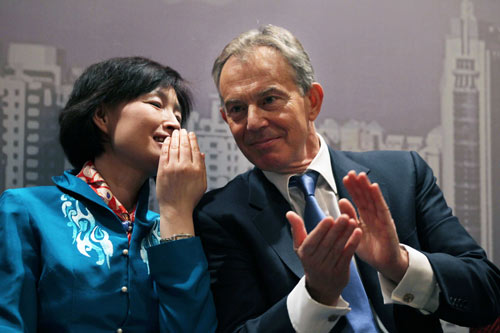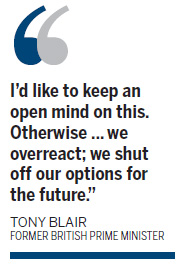China-Europe
'Keep an open mind on nuclear power'
Updated: 2011-03-29 07:52
By Li Xing (China Daily)
|
 Wu Changhua, the Greater China director of the Climate Group, chats with Tony Blair, former British prime minister, during a ceremony to mark the launch of the "China Redesign" program in Beijing on Monday. Wang Jing / China Daily |
Former British PM cautions against overreaction
For the exclusive interview with Tony Blair

BEIJING - The world must be open-minded about the use of nuclear power as a source of clean energy despite the crisis in Japan, Tony Blair, former British prime minister, told China Daily on Monday.
The fallout at Japan's Fukushima Daiichi nuclear plant as a result of the 9.0-magnitude earthquake and ensuing tsunami "make people hesitate, or at least pause, in order to analyze what it all means and what the impact is", he said.
While it is important to make assessments, he cautions against instant reaction. "Let's analyze what it means, because I still think nuclear power is important for the future," he said.
"I'd like to keep an open mind on this. Otherwise, the danger is something like Japan happens, we overreact; we shut off our options for the future. I don't think that is sensible."
Blair is visiting China to help promote the "China Redesign" program, which was launched on Monday. The program is a joint partnership between the Climate Group - an independent, non-profit environmental organization that promotes green growth - and Chinese city governments and businesses. It aims to help cities build green capacity, develop best practices and implement new plans for low-carbon development.
"This is all about China and all about technology, spreading the best practice," he said of the program.
The program is also to facilitate China's efforts in meeting targets set in its 12th Five-Year Plan (2011-2015) to improve energy efficiency and reduce the intensity of carbon emissions per unit of GDP.
"The biggest challenge (to meet the targets) is China's growth and its industrialization is on a scale that the world has never seen before," he said.
In the past two years Blair has visited China 12 times, mainly to promote programs for green growth and low-carbon development. He has also become a witness to changes in China.
"China is changing in all sorts of way, economically, but also socially, culturally; politically I think it is also evolving," he said. "People want a green future, but a future with growth, for jobs, a better life, prosperity.
"We are asking China to develop in a sustainable way when countries like mine developed without regard to the environment," he said. "So this is why there is a great responsibility and obligation to understand why this is such a big challenge (for China) and why it is so important that we help in that."
"The key is technology," he said.
Blair said China is a great place to deploy new green technology.
The sharing of green technologies has taken on added importance as the turmoil in the Middle East highlights the need for countries dependent on oil to diversify their energy supply.
"If it wasn't for Japan, there would be a big push for nuclear energy," he said.
E-paper

Pearl paradise
Dreams of a 'crazy' man turned out to be a real pearler for city
Literary beacon
Venice of china
Up to the mark
Specials

Power of profit
Western companies can learn from management practices of firms in emerging economies

Foreign-friendly skies
About a year ago, 48-year-old Roy Weinberg gave up his job with US Airways, moved to Shanghai and became a captain for China's Spring Airlines.

Plows, tough guys and real men
在这个时代,怎样才"够男人"? On the character "Man"
